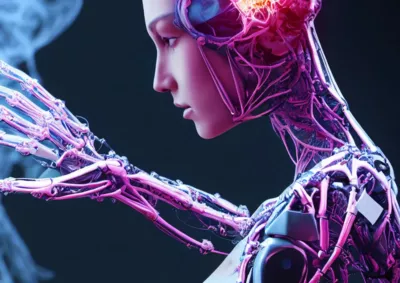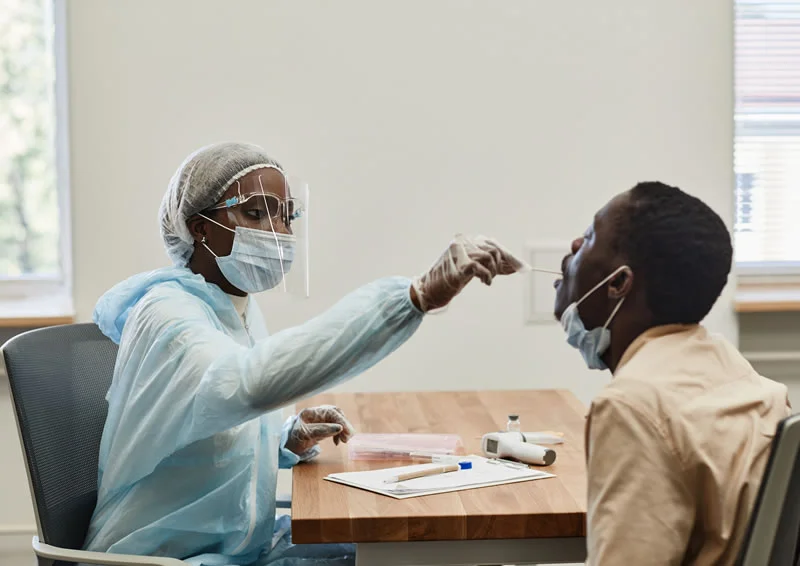NEWS & INSIGHTS: Global Public Health
In the rapidly evolving world of healthcare, the integration of artificial intelligence (AI) has become an undeniable force. From improving diagnosis accuracy to streamlining administrative tasks, AI has the potential to revolutionize public healthcare systems. However, as with any technological advancement, the AI job revolution brings both opportunities and challenges. As we navigate this new era, it is crucial to understand who will thrive and who will struggle in this changing landscape. Will healthcare professionals be able to adapt and embrace AI, leveraging its power to enhance patient care? Or will they find themselves overshadowed by the automation and algorithms, struggling to keep up with the demands of this technology-driven future? Join us as we explore the implications of the AI job revolution in public healthcare and delve into the skills and mindset necessary to thrive in this ever-evolving field.
The impact of AI on jobs in the healthcare industry
Artificial intelligence has already started to make its mark on the healthcare industry, and its impact on jobs cannot be ignored. As AI technology continues to advance, it is expected to automate certain tasks traditionally performed by healthcare professionals, affecting both the clinical and administrative aspects of healthcare.
 One area where AI is already making significant strides is in medical imaging. AI algorithms can analyze medical images such as X-rays, CT scans, and MRIs, helping to detect abnormalities and assist in diagnosis. This technology has the potential to improve accuracy and efficiency, allowing healthcare professionals to focus on more complex cases. However, it also raises concerns about the future of radiologists and other imaging specialists, whose roles may be diminished as AI takes over routine image analysis.
One area where AI is already making significant strides is in medical imaging. AI algorithms can analyze medical images such as X-rays, CT scans, and MRIs, helping to detect abnormalities and assist in diagnosis. This technology has the potential to improve accuracy and efficiency, allowing healthcare professionals to focus on more complex cases. However, it also raises concerns about the future of radiologists and other imaging specialists, whose roles may be diminished as AI takes over routine image analysis.
Another area where AI is expected to have a significant impact is in administrative tasks. AI-powered chatbots and virtual assistants can handle patient inquiries, schedule appointments, and even provide basic medical advice. This automation can free up healthcare professionals’ time, allowing them to focus on more critical aspects of patient care. However, it also raises questions about the future of administrative roles in healthcare, such as medical receptionists and billing specialists.
Overall, the impact of AI on jobs in the healthcare industry will vary depending on the specific roles and tasks involved. While some jobs may be at risk of automation, others have the potential to be enhanced by AI. The key lies in identifying which jobs will thrive and which ones may struggle in the AI job revolution.
Jobs that will thrive in the AI revolution
While AI may automate certain tasks, it also creates new opportunities for healthcare professionals. Jobs that require complex decision-making, critical thinking, and empathy are less likely to be fully automated. Instead, these roles are expected to be augmented by AI, allowing healthcare professionals to provide higher quality care and improve patient outcomes.
One such role is that of the healthcare data analyst. As AI generates vast amounts of data, healthcare professionals skilled in data analysis and interpretation will be in high demand. These analysts will be responsible for extracting valuable insights from the data, identifying trends, and making data-driven recommendations for improving patient care. The ability to understand AI algorithms and work alongside them will be crucial for healthcare data analysts to thrive in the AI revolution.
Another role that will thrive in the AI revolution is that of the AI implementation specialist. These professionals will work closely with healthcare providers to integrate AI technology into their workflows effectively. They will ensure the seamless integration of AI systems, train healthcare professionals in using AI tools, and provide ongoing support. The AI implementation specialist will play a vital role in bridging the gap between AI technology and healthcare practice, helping healthcare professionals embrace and leverage AI effectively.
Additionally, roles that require human connection and empathy, such as nursing and patient counseling, are expected to thrive in the AI revolution. While AI can assist in certain aspects of patient care, the human touch remains irreplaceable. Healthcare professionals who can build trust, provide emotional support, and connect with patients on a deeper level will continue to be in demand.
READ | The Role of Clinical Epidemiology Consulting in Advancing Healthcare in South Africa
Jobs that may struggle in the AI revolution
 While AI offers numerous opportunities, some jobs in the healthcare industry may struggle to adapt to the AI revolution. Jobs that primarily involve routine and repetitive tasks are at a higher risk of being automated. Roles that do not require complex decision-making, critical thinking, or human interaction may be overshadowed by AI technology.
While AI offers numerous opportunities, some jobs in the healthcare industry may struggle to adapt to the AI revolution. Jobs that primarily involve routine and repetitive tasks are at a higher risk of being automated. Roles that do not require complex decision-making, critical thinking, or human interaction may be overshadowed by AI technology.
One such role is that of the medical transcriptionist. AI-powered speech recognition software can now accurately transcribe medical dictations, eliminating the need for manual transcription. This automation significantly reduces the time and effort required for medical documentation, potentially rendering the role of the medical transcriptionist obsolete.
Similarly, roles that involve data entry and administrative tasks may also struggle in the AI revolution. AI-powered chatbots and virtual assistants can handle patient inquiries and schedule appointments more efficiently than manual processes. This automation can lead to a reduced need for administrative roles, such as medical receptionists and billing specialists.
However, it is important to note that while certain tasks within these roles may be automated, there may still be a need for human oversight and intervention. Healthcare professionals who are willing to adapt and upskill themselves in areas where AI cannot fully replace human judgment and empathy may still find opportunities within these roles.
READ | How to Write an Irresistible Grant Proposal and Secure Funding
Adapting to the AI revolution: Upskilling and reskilling
As AI continues to transform the healthcare industry, healthcare professionals must be proactive in upskilling and reskilling themselves to stay relevant in the job market. Adapting to the AI revolution requires a growth mindset and a willingness to embrace new technologies and ways of working.
One way to upskill in the AI revolution is to pursue advanced training in data analytics and AI-related technologies. Healthcare professionals can enroll in courses and certifications that provide a deep understanding of data analysis, AI principles, and AI tools. This will equip them with the knowledge and skills necessary to work alongside AI systems and make informed decisions based on AI-generated insights.
Additionally, healthcare professionals can seek opportunities to gain hands-on experience with AI technology. This can involve participating in AI implementation projects, collaborating with data scientists, or working with AI-powered systems. By actively engaging with AI technology, healthcare professionals can develop a better understanding of its capabilities and limitations, allowing them to effectively leverage AI in their day-to-day practice.
Furthermore, healthcare professionals should focus on developing soft skills that are difficult to automate. Skills such as critical thinking, problem-solving, communication, and empathy will continue to be highly valued in the AI revolution. By honing these skills, healthcare professionals can differentiate themselves from AI technology and provide unique value to patients and healthcare organizations.
Navigating the AI job market in public healthcare
As the AI revolution unfolds in public healthcare, navigating the job market requires a strategic approach. Healthcare professionals must stay updated on the latest advancements in AI and understand the specific skills and qualifications in demand.
One way to navigate the AI job market is to stay connected with industry trends and developments. Following reputable sources, attending conferences and webinars, and networking with AI professionals can provide valuable insights into the evolving job market. By staying informed, healthcare professionals can identify emerging opportunities and align their skills and qualifications accordingly.
Additionally, healthcare professionals should consider seeking mentorship or guidance from AI experts in the healthcare industry. Mentors can provide valuable advice and guidance on navigating the AI job market, identifying relevant training opportunities, and positioning oneself for success in AI-related healthcare roles.
Furthermore, healthcare professionals should leverage online platforms and job boards that specialize in AI-related roles. These platforms often provide insights into the specific skills and qualifications required for AI-related healthcare jobs. By tailoring their resumes and highlighting their AI-related skills and experiences, healthcare professionals can increase their visibility to potential employers in the AI job market.
Conclusion: Embracing the opportunities of the AI job revolution in public healthcare
The AI job revolution in public healthcare has the potential to transform the industry, improving patient care and outcomes. While there are challenges and uncertainties along the way, healthcare professionals who embrace AI and adapt to its integration in healthcare workflows will find numerous opportunities for professional growth and advancement.
By acquiring the necessary skills and qualifications, healthcare professionals can position themselves to thrive in AI-related healthcare jobs. Continuous learning, interdisciplinary collaborations, and networking will be essential for future-proofing careers in the AI-driven future.
As we navigate the AI job revolution in public healthcare, it is crucial to remain mindful of the ethical considerations and challenges that arise. By addressing biases, promoting transparency, and safeguarding patient privacy, we can ensure that the adoption of AI in healthcare aligns with ethical standards and benefits all patients.
In conclusion, the AI job revolution presents a new era of possibilities in public healthcare. By embracing AI, healthcare professionals can leverage its power to enhance patient care and drive positive change in the industry. With the right skills, mindset, and ethical considerations, we can navigate this changing landscape and create a future where AI and healthcare professionals work together to provide the best possible care for patients.
Share This Post, Choose Your Platform!
In the rapidly evolving world of healthcare, the integration of artificial intelligence (AI) has become an undeniable force. From improving diagnosis accuracy to streamlining administrative tasks, AI has the potential to revolutionize public healthcare systems. However, as with any technological advancement, the AI job revolution brings both opportunities and challenges. As we navigate this new era, it is crucial to understand who will thrive and who will struggle in this changing landscape. Will healthcare professionals be able to adapt and embrace AI, leveraging its power to enhance patient care? Or will they find themselves overshadowed by the automation and algorithms, struggling to keep up with the demands of this technology-driven future? Join us as we explore the implications of the AI job revolution in public healthcare and delve into the skills and mindset necessary to thrive in this ever-evolving field.
The impact of AI on jobs in the healthcare industry
Artificial intelligence has already started to make its mark on the healthcare industry, and its impact on jobs cannot be ignored. As AI technology continues to advance, it is expected to automate certain tasks traditionally performed by healthcare professionals, affecting both the clinical and administrative aspects of healthcare.
 One area where AI is already making significant strides is in medical imaging. AI algorithms can analyze medical images such as X-rays, CT scans, and MRIs, helping to detect abnormalities and assist in diagnosis. This technology has the potential to improve accuracy and efficiency, allowing healthcare professionals to focus on more complex cases. However, it also raises concerns about the future of radiologists and other imaging specialists, whose roles may be diminished as AI takes over routine image analysis.
One area where AI is already making significant strides is in medical imaging. AI algorithms can analyze medical images such as X-rays, CT scans, and MRIs, helping to detect abnormalities and assist in diagnosis. This technology has the potential to improve accuracy and efficiency, allowing healthcare professionals to focus on more complex cases. However, it also raises concerns about the future of radiologists and other imaging specialists, whose roles may be diminished as AI takes over routine image analysis.
Another area where AI is expected to have a significant impact is in administrative tasks. AI-powered chatbots and virtual assistants can handle patient inquiries, schedule appointments, and even provide basic medical advice. This automation can free up healthcare professionals’ time, allowing them to focus on more critical aspects of patient care. However, it also raises questions about the future of administrative roles in healthcare, such as medical receptionists and billing specialists.
Overall, the impact of AI on jobs in the healthcare industry will vary depending on the specific roles and tasks involved. While some jobs may be at risk of automation, others have the potential to be enhanced by AI. The key lies in identifying which jobs will thrive and which ones may struggle in the AI job revolution.
Jobs that will thrive in the AI revolution
While AI may automate certain tasks, it also creates new opportunities for healthcare professionals. Jobs that require complex decision-making, critical thinking, and empathy are less likely to be fully automated. Instead, these roles are expected to be augmented by AI, allowing healthcare professionals to provide higher quality care and improve patient outcomes.
One such role is that of the healthcare data analyst. As AI generates vast amounts of data, healthcare professionals skilled in data analysis and interpretation will be in high demand. These analysts will be responsible for extracting valuable insights from the data, identifying trends, and making data-driven recommendations for improving patient care. The ability to understand AI algorithms and work alongside them will be crucial for healthcare data analysts to thrive in the AI revolution.
Another role that will thrive in the AI revolution is that of the AI implementation specialist. These professionals will work closely with healthcare providers to integrate AI technology into their workflows effectively. They will ensure the seamless integration of AI systems, train healthcare professionals in using AI tools, and provide ongoing support. The AI implementation specialist will play a vital role in bridging the gap between AI technology and healthcare practice, helping healthcare professionals embrace and leverage AI effectively.
Additionally, roles that require human connection and empathy, such as nursing and patient counseling, are expected to thrive in the AI revolution. While AI can assist in certain aspects of patient care, the human touch remains irreplaceable. Healthcare professionals who can build trust, provide emotional support, and connect with patients on a deeper level will continue to be in demand.
READ | The Role of Clinical Epidemiology Consulting in Advancing Healthcare in South Africa
Jobs that may struggle in the AI revolution
 While AI offers numerous opportunities, some jobs in the healthcare industry may struggle to adapt to the AI revolution. Jobs that primarily involve routine and repetitive tasks are at a higher risk of being automated. Roles that do not require complex decision-making, critical thinking, or human interaction may be overshadowed by AI technology.
While AI offers numerous opportunities, some jobs in the healthcare industry may struggle to adapt to the AI revolution. Jobs that primarily involve routine and repetitive tasks are at a higher risk of being automated. Roles that do not require complex decision-making, critical thinking, or human interaction may be overshadowed by AI technology.
One such role is that of the medical transcriptionist. AI-powered speech recognition software can now accurately transcribe medical dictations, eliminating the need for manual transcription. This automation significantly reduces the time and effort required for medical documentation, potentially rendering the role of the medical transcriptionist obsolete.
Similarly, roles that involve data entry and administrative tasks may also struggle in the AI revolution. AI-powered chatbots and virtual assistants can handle patient inquiries and schedule appointments more efficiently than manual processes. This automation can lead to a reduced need for administrative roles, such as medical receptionists and billing specialists.
However, it is important to note that while certain tasks within these roles may be automated, there may still be a need for human oversight and intervention. Healthcare professionals who are willing to adapt and upskill themselves in areas where AI cannot fully replace human judgment and empathy may still find opportunities within these roles.
READ | How to Write an Irresistible Grant Proposal and Secure Funding
Adapting to the AI revolution: Upskilling and reskilling
As AI continues to transform the healthcare industry, healthcare professionals must be proactive in upskilling and reskilling themselves to stay relevant in the job market. Adapting to the AI revolution requires a growth mindset and a willingness to embrace new technologies and ways of working.
One way to upskill in the AI revolution is to pursue advanced training in data analytics and AI-related technologies. Healthcare professionals can enroll in courses and certifications that provide a deep understanding of data analysis, AI principles, and AI tools. This will equip them with the knowledge and skills necessary to work alongside AI systems and make informed decisions based on AI-generated insights.
Additionally, healthcare professionals can seek opportunities to gain hands-on experience with AI technology. This can involve participating in AI implementation projects, collaborating with data scientists, or working with AI-powered systems. By actively engaging with AI technology, healthcare professionals can develop a better understanding of its capabilities and limitations, allowing them to effectively leverage AI in their day-to-day practice.
Furthermore, healthcare professionals should focus on developing soft skills that are difficult to automate. Skills such as critical thinking, problem-solving, communication, and empathy will continue to be highly valued in the AI revolution. By honing these skills, healthcare professionals can differentiate themselves from AI technology and provide unique value to patients and healthcare organizations.
Navigating the AI job market in public healthcare
As the AI revolution unfolds in public healthcare, navigating the job market requires a strategic approach. Healthcare professionals must stay updated on the latest advancements in AI and understand the specific skills and qualifications in demand.
One way to navigate the AI job market is to stay connected with industry trends and developments. Following reputable sources, attending conferences and webinars, and networking with AI professionals can provide valuable insights into the evolving job market. By staying informed, healthcare professionals can identify emerging opportunities and align their skills and qualifications accordingly.
Additionally, healthcare professionals should consider seeking mentorship or guidance from AI experts in the healthcare industry. Mentors can provide valuable advice and guidance on navigating the AI job market, identifying relevant training opportunities, and positioning oneself for success in AI-related healthcare roles.
Furthermore, healthcare professionals should leverage online platforms and job boards that specialize in AI-related roles. These platforms often provide insights into the specific skills and qualifications required for AI-related healthcare jobs. By tailoring their resumes and highlighting their AI-related skills and experiences, healthcare professionals can increase their visibility to potential employers in the AI job market.
Conclusion: Embracing the opportunities of the AI job revolution in public healthcare
The AI job revolution in public healthcare has the potential to transform the industry, improving patient care and outcomes. While there are challenges and uncertainties along the way, healthcare professionals who embrace AI and adapt to its integration in healthcare workflows will find numerous opportunities for professional growth and advancement.
By acquiring the necessary skills and qualifications, healthcare professionals can position themselves to thrive in AI-related healthcare jobs. Continuous learning, interdisciplinary collaborations, and networking will be essential for future-proofing careers in the AI-driven future.
As we navigate the AI job revolution in public healthcare, it is crucial to remain mindful of the ethical considerations and challenges that arise. By addressing biases, promoting transparency, and safeguarding patient privacy, we can ensure that the adoption of AI in healthcare aligns with ethical standards and benefits all patients.
In conclusion, the AI job revolution presents a new era of possibilities in public healthcare. By embracing AI, healthcare professionals can leverage its power to enhance patient care and drive positive change in the industry. With the right skills, mindset, and ethical considerations, we can navigate this changing landscape and create a future where AI and healthcare professionals work together to provide the best possible care for patients.




